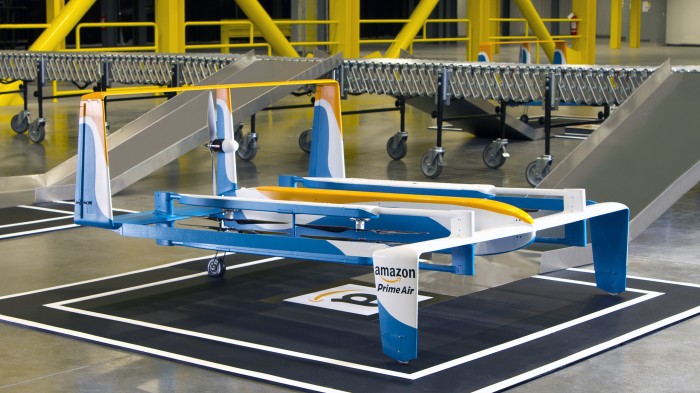U.K. Signs a Deal with Amazon to Test Delivery Drones
Retail giant Amazon has partnered with the British government to test drones for package delivery—a major coup for the company, which is still forbidden from testing certain drone technologies in the U.S.
In June, the U.S. Federal Aviation Administration released updated rules governing drone use that opened American skies up to limited use of commercial drones. Crucially for Amazon, however, that did not include automated flights guided by GPS, or flights in which a drone leaves an operator’s line of sight.
CEO Jeff Bezos has made no bones about his bullish stance on delivering packages by drone. In 2013, he went on 60 Minutes and talked about drones as the future of the company. But the firm’s massive delivery network remains mostly earthbound, and Amazon has railed against what it sees as the FAA’s sluggish response to technological change.

During its announcement last month, FAA chief Michael Huerta called the rules “just our first step” and promised to review some of the technologies Amazon is interested in deploying, like the ability to automatically sense and avoid obstacles.
The company, it would seem, is tired of waiting. Though the New York Times reports that Amazon has no plans to reduce its drone research in the U.S., it has set up drone testing programs in the Netherlands and Canada.
In announcing its deal with the Civil Aviation Authority, the U.K.’s version of the FAA, Amazon said the partnership “brings Amazon closer to our goal of using drones to safely deliver parcels in 30 minutes to customers in the U.K. and elsewhere around the world.” That’s more than can be said, unfortunately, for American shoppers, who are looking forward to the day when their newly bought goodies will descend from the heavens.
(Read more: New York Times, Fortune, “Sorry, Shoppers: Delivery Drones Might Not Fly for a While,” “New FAA Rules Have Commercial Drones Primed for Launch”)
Keep Reading
Most Popular
Large language models can do jaw-dropping things. But nobody knows exactly why.
And that's a problem. Figuring it out is one of the biggest scientific puzzles of our time and a crucial step towards controlling more powerful future models.
The problem with plug-in hybrids? Their drivers.
Plug-in hybrids are often sold as a transition to EVs, but new data from Europe shows we’re still underestimating the emissions they produce.
How scientists traced a mysterious covid case back to six toilets
When wastewater surveillance turns into a hunt for a single infected individual, the ethics get tricky.
Google DeepMind’s new generative model makes Super Mario–like games from scratch
Genie learns how to control games by watching hours and hours of video. It could help train next-gen robots too.
Stay connected
Get the latest updates from
MIT Technology Review
Discover special offers, top stories, upcoming events, and more.